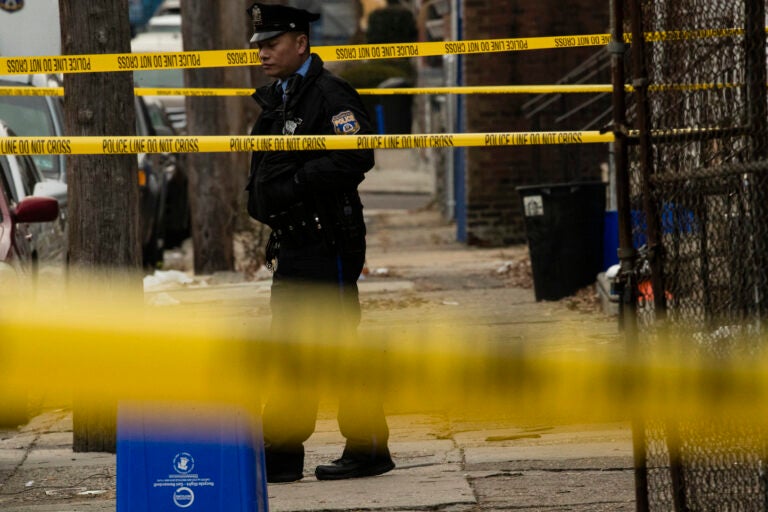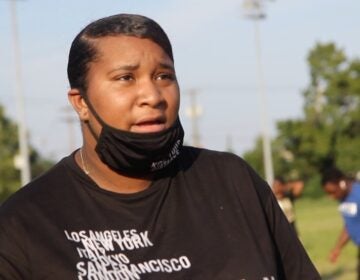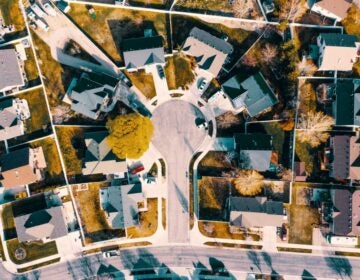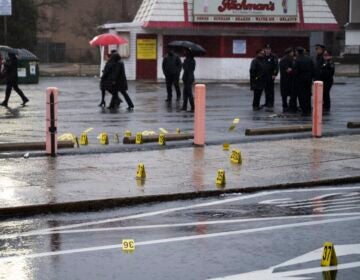New Philly initiative seeks to increase convictions for gun-related crimes
The city has struggled to secure convictions for non-fatal shootings and illegal gun possession. A new collaboration seeks to change that.

In this Dec. 14, 2018, file photo, a Philadelphia police officer stands by a crime scene on Woodstock Street. (AP Photo/Matt Rourke, File)
In response to this year’s dramatic spike in shootings, the Philadelphia Police Department and the District Attorney’s Office have launched a new initiative with a straightforward mission: to secure more convictions for people arrested for gun-related crimes.
A working group will closely examine weekly arrests for non-fatal shootings and illegal gun possession. The goal is to proactively identify issues that could make those cases harder to win in court. For example, issues that could lead a judge to suppress — keep out — certain evidence at trial.
The collaborative effort began last week.
“Hopefully, we can begin to understand why this is occurring and have all participating parties address their part and their areas of responsibility,” said Police Commissioner Danielle Outlaw.
The city’s top cop outlined the new initiative during a virtual hearing held Monday by City Council’s Special Committee on Gun Violence Prevention, which has now convened six times to discuss this year’s surge in shootings and homicides.
‘The bloodiest year of the 21st Century’
By the start of the hearing, there were more than 2,100 shooting victims in 2020, a 53% increase over the same time in 2019.
The annual total for homicides was creeping closer to 500. Since 1960, the city has only hit that grim milestone once, according to police. And it remains the highest single-year tally during that span.
“Although most of us will remember 2020 as the year of the COVID-19 pandemic, I will also remember 2020 as the bloodiest year of the 21st Century,” said Councilmember Kenyatta Johnson, who chairs the special committee.
During Monday’s hearing, city lawmakers heard from residents desperate to disrupt the cycle of gun violence in their communities, as well as help those considered most at-risk for picking up a gun — or being shot.
Issac Gardner, an activist who goes by Ikey Raw, told council members that most of the bloodshed in the city is rooted in retaliation, and that suspects often remain on the street because witnesses fear they’ll be shot, possibly killed if they talk to police.
Gardner, who counsels families who have lost loved ones to gun violence, said residents still want results from police and prosecutors. To them, that’s all that matters.
“They want justice,” said Gardner. “They want a conviction.”
Police have struggled to arrest people for non-violent shootings, despite the fact that only a small percentage of the city’s population is believed to be responsible for the violence.
At the same time, city prosecutors have struggled to secure convictions in those cases.
Between 2015 and 2019, only 22% of the 6,344 shootings during that five-year span led to an arrest, according to data from the District Attorney’s Office. And even fewer of those shootings resulted in a conviction — around 11%.
Outlaw said Monday that convictions for illegal gun possession are also down. This year, prosecutors have secured convictions less than half of the time.
Five years ago, they secured convictions in 75% of those cases, according to data from the DA’s office.
During the hearing, District Attorney Larry Krasner told council members his office recently analyzed 400 gun-related cases to determine why they didn’t end with a conviction. The results, part of a forthcoming study, show that roughly half of those cases failed because civilian witnesses did not show up to court to testify. Another 23% of the cases had “weak evidence,” which Krasner said was not necessarily a reflection of his office or the police department’s work.
He also called for more funding for the police department’s forensics department, which is responsible for testing physical evidence collected during criminal investigations. The results are often presented in court.
“Getting guns off the street is important. Getting convictions in those cases is more important,” said Krasner.
Tyrique Glasgow, executive director of the Young Chances Foundation, has lost family and friends to gun violence, including this year. He praised the work Johnson’s special committee has done this year, but said it can’t stop with the turn of the calendar.
Neighborhoods reeling from routine gun violence will still be reeling next year.
“People don’t lose their memories just because the clock turns,” he said.

Get daily updates from WHYY News!
WHYY is your source for fact-based, in-depth journalism and information. As a nonprofit organization, we rely on financial support from readers like you. Please give today.






